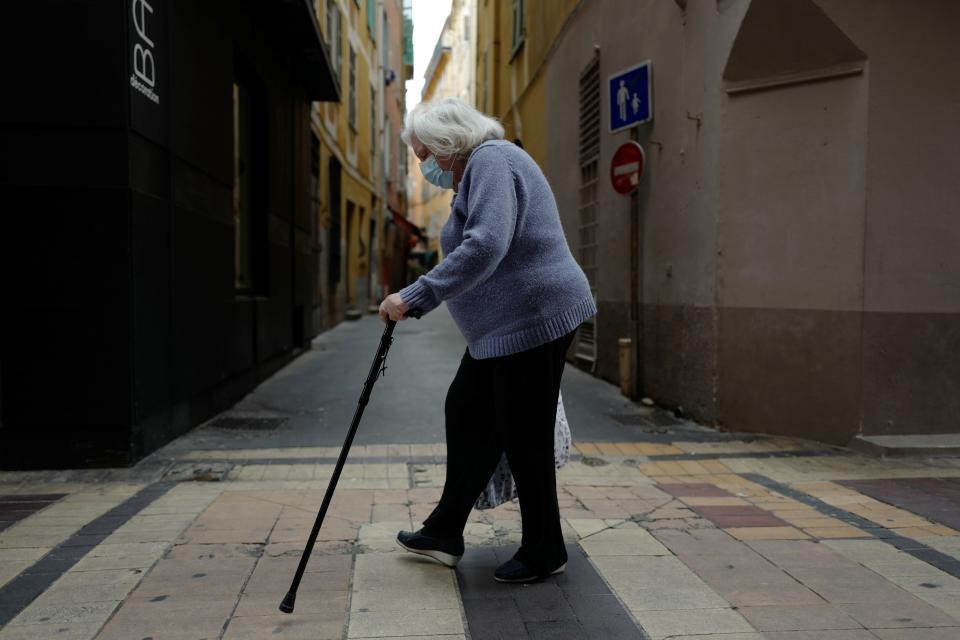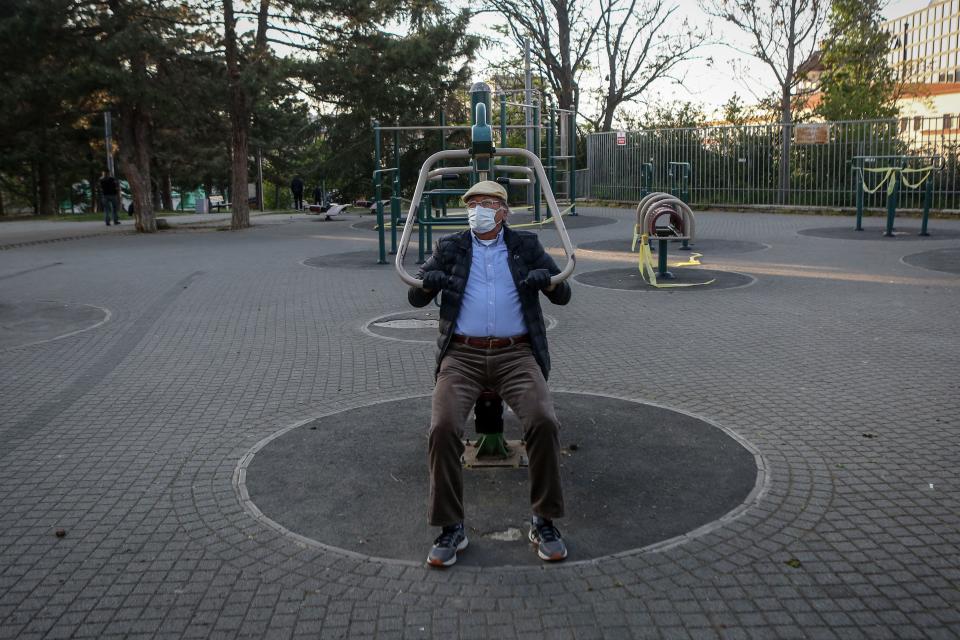Coronavirus: Anyone over 60 is 'high risk', scientists warn

Scientists are urging anyone over 60 to consider themselves “high risk” amid the coronavirus outbreak.
Boris Johnson has introduced draconian lockdown measures that only allow Britons to venture out for “very limited purposes” like shopping for essentials.
These restrictions stand regardless of an individual’s age; however, officials recognise those over 70 as being particularly at risk of the infection.
Scientists from Imperial College London and the University of Exeter have argued that this overlooks the more than 7 million Britons between 60 and 69 who may be at “considerable” risk.
Early research suggests the coronavirus is mild in four out of five cases, but it can trigger a respiratory disease called COVID-19.
One expert warned that immunity can decline “a decade earlier” than the government’s 70-year “cut-off”, adding that “you can be a very fit 65-year-old, but your immune system will not work as well as it did when you were 20”.

Writing in the Royal Society of Medicine journal, the scientists pointed to research from China and Italy, former epicentres of the pandemic.
The death rate among infected people aged 60 to 69 in China and Italy is reportedly 3.6% and 3.5%, respectively.
Latest coronavirus news, updates and advice
Live: Follow all the latest updates from the UK and around the world
Fact-checker: The number of COVID-19 cases in your local area
Explained: Symptoms, latest advice and how it compares to the flu
The coronavirus’s fatality rate has been debated, with some experts arguing it cannot be accurately gauged until the outbreak is over.
At the beginning of March, the World Health Organization announced the virus had killed 3.4% of patients worldwide, which others called a probable “overestimate”.
Scientists from the University of Hong Kong later looked at more than 48,000 confirmed cases in Wuhan, the Chinese city where the virus likely emerged.
They found the average death rate among patients under 30 was 0.3%, rising to 0.5% for those between 30 and 59, and 2.6% for people aged 60 or above.
Based on the data, the Imperial and Exeter team are encouraging those over 60 to be particularly cautious.
“National and global spread of COVID-19 is accelerating,” said study author Professor Azeem Majeed from Imperial College London.
“To reduce hospitalisations, intensive care admissions and death we recommend those aged between 60 and 69 are particularly stringent when implementing public health measures such as social distancing and personal hygiene.”
Officials have urged people to wash their hands regularly for 20 seconds, the time it takes to sing Happy Birthday twice.
When people do venture out for essentials or to exercise, a 2metre (6ft) distance should be maintained with passersby outside of their household.

‘As we get older, so do our immune systems’
Older people are more at risk of infections in general, which is why people aged 65 or over are offered a free flu vaccine on the NHS.
“As we get older, so do our immune systems, which results in them becoming slower and less effective at fighting off infections that we have previously come across,” said Professor Arne Akbar from the British Society for Immunology.
“With coronavirus infections, what seems to be happening in older patients is their immune systems are less able to move through the different stages of immune response needed to clear the disease.
“Instead they get ‘stuck’ in the early stage of immune response, which results in a bigger build-up of debris in the lungs and more inflammation, leading to more serious symptoms.
“Physical changes to the lungs of older people [also] mean they have poorer cough strength and reduced functioning of cilia, the fine hairs that line the airways.”
Cough, along with fever, is one of the tell-tale symptoms of the coronavirus.
“[Reduced cilia function] results in a decreased ability to clear mucus, which traps infections in the lungs, where they can build up,” said Professor Akbar.
The government’s “cut-off” for high-risk but otherwise healthy individuals is 70.
“Some people may start to have declining immunity a decade earlier,” said Professor Akbar.
“The changes that happen to our immune systems as we get older are not necessary reflected in how healthy we feel; you can be a very fit 65-year-old, but your immune system will not work as well as it did when you were 20”.
Immunity aside, older people may also be more at risk of health conditions that make an individual vulnerable to coronavirus complications.
“Illnesses that predispose to this higher risk include chronic lung disease, heart disease, hypertension or diabetes, all of which are found at higher rates in older people,” said Dr Tom Wingfield from the Liverpool School of Tropical Medicine.
Dr James Gill from Warwick Medical School pointed out that people in their sixties are generally six times less likely to die from any cause than those a decade older.
“Thus whilst it may be reasonable to question whether measures should be extended to those in the 60-to- 70 years group, this should not cause significant concern for those people,” he said.
Dr Gill called for a “degree of pragmatism”.
“If a person older than 60 is already furloughed from work, then there is no significant disadvantage to personally implementing a more stringent approach to social distancing and self-isolation,” he said.
“Conversely, if a person is still required to attend work, then a discussion with their employer to assess if there are additional ways that their exposure could be reduced further would be seen by many as a reasonable conversation to have.”
Two experts also raised concerns about the call for retired NHS staff to return to work amid the outbreak.
“Although not specifically discussed in this article, this does perhaps raise the question of whether healthcare workers in that age group should be shielded from frontline care of patients with COVID-19, particularly if they have additional risk factors,” said Dr Andrew Freeman from Cardiff University.

What is the coronavirus?
The coronavirus is one of seven strains of a virus class that are known to infect humans.
Others trigger everything from the common cold to severe acute respiratory syndrome (Sars), which killed 774 people during its 2002/3 outbreak.
Since the coronavirus outbreak was identified, more than 2.5 million cases have been confirmed worldwide, according to Johns Hopkins University.
Of these cases, over 695,300 are known to have “recovered”.
Globally, the death toll has exceeded 178,400.
The coronavirus mainly spreads face-to-face via infected droplets expelled in a cough or sneeze.
There is also evidence it may be transmitted in faeces and survive on surfaces.
Although most cases are mild, pneumonia can come about if the coronavirus spreads to the air sacs in the lungs.
This causes them to become inflamed and filled with fluid or pus.
The lungs then struggle to draw in air, resulting in reduced oxygen in the bloodstream and a build-up of carbon dioxide.
The coronavirus has no “set” treatment, with most patients naturally fighting off the infection.
Those requiring hospitalisation are given “supportive care”, like ventilation, while their immune system gets to work.
Officials urge people to ward off the coronavirus by washing their hands regularly and maintaining social distancing.




